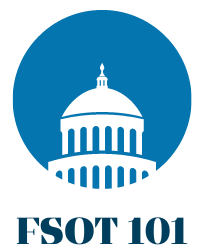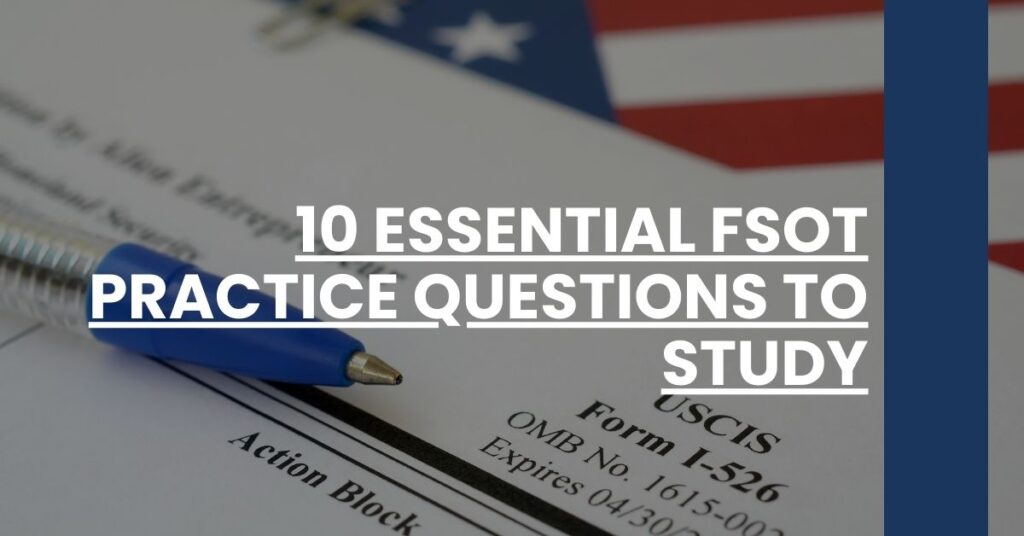Ever wonder how you’d fare in the challenging world of diplomacy? Preparing for the Foreign Service Officer Test (FSOT) is no small feat, and your success hinges on practice.
This article is designed to walk you through the most effective fsot practice questions and strategies to ensure your preparedness isn’t left to chance. With our guidance, deciphering the nuances of the FSOT will seem far less daunting.
- 1. Understanding FSOT Structure and Sections
- 2. Examining FSOT Eligibility Requirements
- 3. Demystifying the Registration Process
- 4. Essential Topics in U.S. Government and Economics
- 5. Navigating World History and Geography Questions
- 6. Strategies for Successful Essay Writing
- 7. Tackling Job Knowledge Questions
- 8. Effective Study and Preparation Techniques
- 9. Mock Tests: Your Secret Weapon
- 10. Decoding the Scoring System
1. Understanding FSOT Structure and Sections
Embarking on your journey to master the Foreign Service Officer Test (FSOT) begins with a foundational understanding of what to expect on test day. Consider this your roadmap to navigating the multilayered terrain of the FSOT, which is designed not only to assess your knowledge but also to measure your potential for the critical and analytical rigors of a Foreign Service career.
The FSOT is structured into four distinct sections:
- Job Knowledge: This section evaluates your grasp on a range of subjects pivotal to international relations and Foreign Service work. Your preparation for job knowledge areas is key, with fsot practice questions helping to benchmark your readiness.
- English Expression: Superior communication skills are indispensable for a Foreign Service Officer. Hence, your proficiency in English grammar, composition, and reading comprehension is put to the test here.
- Situational Judgment: Prepare to be challenged on your decision-making and interpersonal skills through hypothetical scenarios that gauge how you would handle complex situations.
- Written Essay: Exhibiting your persuasive writing talents, you get to argue your viewpoint on a significant issue, demonstrating your ability to construct a coherent and compelling narrative under time constraints.
The insights from the comprehensive guide on how to approach the FSOT and an overview of the FSOT’s structure can prove indispensable as you tailor your study regimen to conquer each section with finesse.
2. Examining FSOT Eligibility Requirements
Before you dive headfirst into fsot practice questions, ensure you meet the criteria to sit for the FSOT. The eligibility echelons are clear:
- You must be a U.S. citizen—a crucial requirement given the diplomatic responsibilities that come with the role.
- Aspiring diplomats need to be 21 years of age but not older than 59 at the time of application.
- Lastly, be available for worldwide assignment—wherever you’re needed, you’ll serve.
Understanding the details of these requirements is paramount, and resources such as the official FSOT FAQs provide clarity on nuances that may impact your application.
3. Demystifying the Registration Process
Securing your spot for the FSOT involves a straightforward registration process. Knowing when and how to register is vital to ensure you’re not side-tracked on your road to the Foreign Service:
- Mark Your Calendar: Registration typically opens about five weeks in advance of the testing window. Always verify current dates as they can shift year-to-year.
- Complete Your Application: You’ll need to provide personal information and possibly answer questions about your education and work experience.
- Schedule Your Test: Once registered, choose a convenient location and time that fits best with your preparation timeline.
Utilize resources provided by U.S. Embassies to familiarize yourself with the registration nuances and employ fsot practice questions to stay sharp as your examination date approaches.
4. Essential Topics in U.S. Government and Economics
When polishing your prowess in U.S. government and economics, focusing on key topics can sharpen your edge:
- Constitutional Foundations: Understand the building blocks of the American political system, including checks and balances, federalism, and the roles of different branches of government.
- Policy Processes: Grasp how policies are crafted and executed from thought to law.
- Economic Indicators: Familiarize yourself with GDP, unemployment rates, and fiscal policies, which are staples among fsot practice questions.
The DOSCareers mobile app can serve as a resourceful companion, offering a fountain of retired FSOT questions to test your knowledge in these areas.
5. Navigating World History and Geography Questions
Your understanding of world history and geography is also put under the microscope. This segment is not merely a test of memorized facts but an evaluation of your ability to connect historical dots and comprehend geographic contexts. Key focus areas include:
- Historical movements that shaped societies, like the Renaissance or Industrial Revolution.
- The roles and effects of pivotal events such as World War I and II.
- Technological advancements across ages that have global influence, from the invention of the wheel to the internet.
ProProfs and other online platforms offer practice questions that mirror the type of world history and geography queries you’ll face, while sources like Path to Foreign Service suggest the horizon of topics that the FSOT might cover, enabling you to gear your studies towards a holistic understanding of our world’s rich tapestry.
6. Strategies for Successful Essay Writing
Writing a compelling essay under the pressure of the FSOT is an art form in itself. This is where your capacity to articulate your thoughts with precision and clarity is truly put to the test. Follow these strategies to ensure you’re well-prepared to make your argument stand out:
- Develop Your Thesis: Have a clear and direct thesis statement that serves as the backbone of your essay.
- Create an Outline: Organize your thoughts into an outline format. This helps in maintaining structure and ensuring all points support your thesis.
- Practice Makes Perfect: Regularly writing timed essays can boost your confidence and hone your writing skills, which is why engaging with fsot practice questions that include essay prompts is crucial.
The FSOT Essay Simulator can be an exceptionally practical tool for crafting and refining essays that reflect the level of sophistication expected by the FSOT graders.
7. Tackling Job Knowledge Questions
With a vast array of subjects to cover, the job knowledge segment of the FSOT can be intimidating. However, with a strategic approach, you can navigate through the thicket of fsot practice questions that span the spectrum of international affairs, history, culture, management, computers, economics, and more. Here are some targeted tips:
- Categorical Learning: Group your study material into categories to make retention more feasible.
- Adaptable Knowledge: Focus on understanding concepts, not just on memorizing facts, to apply your knowledge to various question formats.
- Simulation: Use practice exams and apps to simulate real test conditions and test your knowledge.
For a comprehensive array of topics, take advantage of the FSOT Sample Job Knowledge Test to self-evaluate your proficiency across different domains.
8. Effective Study and Preparation Techniques
Your FSOT results can hinge heavily on how effectively you prepare. Integrating a routine and methodology to your study can transform a daunting syllabus into an achievable goal. Here’s how to do it:
- Set Realistic Goals: Break down your syllabus into manageable portions and set daily, weekly, and monthly goals.
- Consult Expert Resources: Leverage the State Department’s recommended reading lists and expert-created study guides to elevate your preparation.
- Simulate Real Test Conditions: Familiarize yourself with the test’s timing and format by taking full-length, timed practice tests.
Foundational resources like study plans and test-specific guidance from resources such as What Diplomats Do can be invaluable assets as you build your study strategy.
9. Mock Tests: Your Secret Weapon
Simulated examinations, or mock tests, can be your secret weapon as you aim to conquer the FSOT. Incorporating these into your study routine can aid in:
- Time Management: Learning to navigate through sections within the allocated time frame.
- Identifying Weaknesses: Pinpointing areas that require targeted improvement.
- Growth Tracking: Offering tangible metrics to gauge your progress over time.
Grasping the format of the test through practice exams can erase the unknown and replace it with familiarity, empowering you to walk in on test day with confidence.
10. Decoding the Scoring System
Understanding how your efforts translate to scores gives you a sharper focus on what to prioritize within your preparation. Here’s what you need to keep in mind:
- Every section has its scoring scale, with the Job Knowledge and Situational Judgment sections scored on a scale of 0-60, and the English Expression section on a scale of 0-80.
- The essay is scored on a scale of 0-12, with a passing grade being no less than a 6.
Arming yourself with knowledge on how the FSOT is graded can allow you to tailor your preparation to target those critical score-impacting areas.
Remember, your transition from student to diplomat begins with how well you marry studious preparation with strategic approach, epitomized by your engagement with fsot practice questions. No test can truly encapsulate your potential, but mastery of the FSOT is undoubtedly your first step on the diplomatic ladder.

